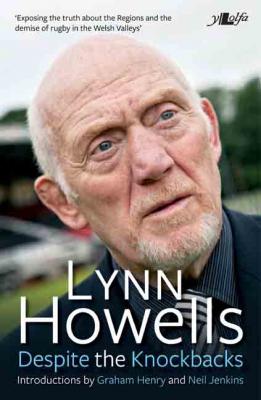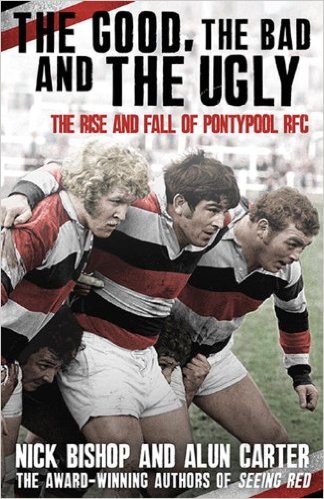“I even got a letter from one of the “money men” from Ebbw Vale offering me a one-way first-class ticket back to New Zealand. He was obviously concerned about my ideas about regional/franchise rugby. It amazed me how some successful businessmen wanted to protect a rugby structure that has brought failure and pain to those involved in rugby in Wales for 30 years.”
“Later on, when Wales started to get to grips with professionalism, how one of the franchise teams was not based in Pontypridd has always been a mystery to me. That enormous passion for the game in Wales seemed to me to have its backbone in the Valleys, and Pontypridd led that.”
Sir Graham Henry, former Welsh (1998-2002) & New Zealand (2004-11) national rugby coach, writing a foreword for the autobiography of Lynn Howells in 2012.

I always like to quote “the Great Redeemer“, when discussing the structural/systemic problems in Welsh rugby. There is a certain aptness about it, for Sir Graham Henry was the driving force behind the initial movement towards regional rugby.
Obviously the April 2003 “super” club botch job, after frustrating what the WRU finally proposed in December 2002 (link), came more than a year after he had returned to New Zealand, and was very different to what he envisaged (link) – in terms of identity, branding, ethos, central contracting, and (also critically as a Kiwi) culture – but he was the driving force behind concentrating Welsh rugby’s limited playing and financial resources into a few teams and making it truly professional.
And given his cerebral approach, the analytical approach of the Auckland headmaster, you can see why he was the man that Terry Cobner (the then WRU Director of Rugby) wanted to hire after the 0-51 “home” humiliation to the French at Wembley in 1998.
Sir Graham Henry’s assistant coach with Wales between 1998 and 2001 was Lynn Howells, who simultaneously coached Cardiff RFC between 1999-2001 and later the Celtic Warriors for their sole 2003-04 season. He was an assistant coach at Pontypridd RFC in the 1990s, and head coach there between Cardiff RFC and the Celtic Warriors region. He has subsequently coached outside Wales, from Italy to Scotland to England to Romania. His views clearly reflect a substantial section of Welsh rugby, much wider than just Pontypridd RFC, subsequently marginalised and alienated from the lower (non-Test) professional tier.
In April I recommended people read this history of Pontypool RFC (link). Not because of the history of Pontypool RFC itself, which few (sadly, and misguidedly so in my opinion!) will be interested in but, because of the last three chapters of this book covering wider issues:
Chapter 8 – The nightmare ’90s and the dawn of professionalism
Chapter 9 – The long road to regionalisation
Chapter 10 – A cemetery in the valleys

These go well beyond the narrow confines of the Eastern Valley club itself and cover the issues in the wider overall context of Welsh rugby and the structural/systemic failures and in particular the small country failure to adapt to professionalism in the way New Zealand (and even Ireland) did.
These chapters were clearly primarily the work of Nick Bishop, a wonderful analytical mind and who also happened to be Graham Henry’s analyst when at the WRU. His analysis remains perceptive to this day, particularly his regular articles on the outstanding Australian Green and Gold rugby website (link).
It is a book that I urge everybody with a genuine interest in Welsh rugby to read. A WRU director currently has custody of my personal copy, and I won’t be taking it back until he can practically recite those three chapters to me…so nobody escapes my plea!
Another book that I would highly recommend Welsh rugby fans read is this Lynn Howells autobiography (link). It is a fascinating book, but this one does not gently ease into the difficult structural/systemic issues. Chapter 1 is entitled “They Killed Valleys Rugby“. The opening sentence of the chapter is simply “THE BASTARDS“. A Maerdy boy, who coached Pontypridd RFC, as direct and confrontational as valleys rugby on the paddock.
There are some wonderful anecdotes, particularly of the dinner at the restaurant at The Rocks in Sydney in 1998. Auckland coach Graham Henry spent the weekend in Sydney with Terry Cobner (WRU Director of Rugby), Glanmor Griffiths (WRU Chairman) and Dennis Gethin (WRU Secretary, now WRU President), who had flown in after the Wales tour of South Africa to discuss his taking the Welsh coaching job. And who should stumble into the same restaurant on an overnight stopover en route to a fact finding mission in NZ?! Lynn Howells, with Leigh Jones. And a taster of Graham Henry’s sardonic sense of humour, when asked for his views on Wales losing 13-96 to the Springboks (“A little bit unfortunate, mate“).
And some interesting observations on Cardiff RFC, and a proactive boardroom. Some very kind words about Geraint John, then his assistant coach and now of the WRU, some interesting comments and observations on the player power issues and overall culture.
But where the book really excels is in relation to the events of 2002-04, and how the club meritocracy was ended, or rather finally put out of its misery, at the lower (non-Test) professional tier. How 4 intended regions became 4 actual “super” clubs, via 5 “super” clubs., and all the realpolitik and shenanigans involved with the ugly business. No national strategic thinking or planning, just brutal sectional club self interest and necessary overriding governing body cost cutting. Ultimately the right number, through the financially weakest being culled off in 2004. But, still in 2016, the wrongly branded teams, with the wrong governance, and in at least one instance obviously in the wrong location.
And nobody who reads this book will ever again repeat the nonsense that the Celtic Warriors were some sort of failed “Valleys region“. They were not a “Valleys region“, just a “super” club from club amalgamation, even before Pontypridd RFC went into administration in October 2003 and lost their half share of the franchise. Besides, the backing of Pontypridd RFC by Bernard Jones of Just Rentals/Buys As You View was always of a different type and on a smaller scale than at many of the other then major clubs.
Leighton Samuel had invested heavily in corporate facilities on the east side of the Brewery Field, so Sardis Road with its very limited rented break even corporate facilities was of no use to him. That was the absurdity of the Celtic Warriors, and a testimony to the madness of 1995-2003, that we ended-up with a “region” that was another uneasy club amalgamation and with the corporate facilities in one location and the greater part of the fan base in another and with no breathing space or funding to address this issue.
The Celtic Warriors became essentially a Bridgend “super” club, whose benefactor was the one most vulnerable to any attempts to kill one “region” as the unwanted/superfluous 5th that David Moffett and Tony Brown had warned against. 5 does not go into 4, as Pontypool RFC fans will currently tell you after the 2015-16 season conclusion. There was only enough WRU and TV funding for 4 teams, a point that in fairness was repeatedly made by Tony Brown of Newport RFC.
The WRU did not even have the money to buy out Leighton Samuels, so the other 4 regions paid £312,500.00 each. For that they (1) permanently increased their own future share of WRU payments from 20% to 25%, and (2) each got a share of a strong Celtic Warriors squad (which had finished 4th in the Celtic League and defeated eventual Heineken Cup winners Wasps at High Wycombe in the pool stages). And the boundaries of the Blues and Ospreys regions additionally expanded, bringing fresh playing talent into their regional player development pathways. Especially District C to the Blues, from where they now draw the majority of their players. And the Blues got the Celtic Warriors place in the 2004-05 Heineken Cup. Good business, a bitter taste.
There is a still a very vocal small band of financial/business “experts” on social media supporting the “super” club model. I say “experts“, but most of them couldn’t tell the difference between Goldman Sachs and their local newsagents. They think the J curve effect is a rugby drill and monetary targets mean how much their professional “club” can spend beyond its income. They remind me of New Labour a decade ago and their love/awe of the bankers, naïve about the nature of the deregulated beast let alone aware that sub-prime US mortgages were being bundled-up and sold within AAA securities.
So it’s somewhat ironic that we conclude with acknowledging that a rugby coach, from “Little Moscow” up at the head of the Rhondda Fach, has a better grasp of basic free market principles than them:
“For me, from a rugby point of view, it was never thought through. If rugby becomes a money game then you have to have the support. If you don’t put the teams in the right places then you don’t get the support.”
4 years on from the publication of this book, regional rugby remains further away than ever from the optimal level of fan, sponsor, broadcaster and WRU support. And that means a relative competitive £ disadvantage. “Always follow the money“, as one of my old LL.M professors used to put it when analysing a piece of commercial litigation. Advice, if it was ever known, that has never been followed at this troubled tier of the WRU pyramid.
And the bitter legacy of all of this? Lynn Howells had this to say, on behalf of probably many in the South Wales valleys:
“The Warriors went into oblivion and the Blues got their place in the Heineken Cup. The game in the heartland of Welsh rugby was dead; killed by a governing body whose Memorandum of Association states its duty: “to promote, foster, encourage, control and improve rugby football in Wales”. The bastards. They had got what they wanted, four regions. You can be very certain nowadays that if one of the four remaining regions got into difficulty the WRU would bail them out.”
Perhaps over stating it, as the WRU got lumbered with 4 “super” clubs and not exactly the 4 sustainable and viable representative regions they ideally wanted, but you get the overall sentiments. Unambiguously.

Very good article, but I would say that as a Ponty Fan. Keep them coming All articles are well written , reasoned and evidenced.
LikeLike
Pingback: (23) Overview of my Blog (so far) on Welsh rugby’s major structural/systemic problems – TheVietGwent
Pingback: The eastern Glamorgan “postcodes” of Clive Jones – finally kick starting alignment at the troubled Blues region? | The VIET GWENT blog